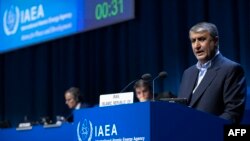Iran slammed U.N. nuclear watchdog chief Rafael Grossi after the agency raised concerns over covert changes to equipment at its Fordo uranium enrichment plant, state media said Saturday.
The criticism of Grossi comes after the International Atomic Energy Agency director-general said he plans to visit Tehran in February for talks on getting it to increase cooperation over its activities, amid stalled negotiations to revive a landmark deal over Iran's nuclear program.
The IAEA said in a confidential report seen by AFP Wednesday that Iran had substantially modified an interconnection between two centrifuge clusters enriching uranium to up to 60 percent at the Fordo Fuel Enrichment Plant (FFEP), without giving prior notice.
Iran said later an inspector had "inadvertently" reported the changes, and that Grossi had issued the report despite the matter being resolved — a response that the United States and its allies criticized as "inadequate."
"We gave a letter to the agency that an inspector... made a mistake and gave an incorrect report," Mohamad Eslami, the head of the Atomic Energy Organization of Iran, was quoted as saying by state news agency IRNA.
"But yet again the director-general of the agency released this issue to the media," he said, labelling it "unprofessional and unacceptable" behavior.
"We hope that this practice will not be continued... because this is not acceptable for his reputation and the agency."
The IAEA had said that during an unannounced Fordo inspection on January 21 it found "two IR-6 centrifuge cascades... were interconnected in a way that was substantially different from the mode of operation declared by Iran to the agency."
Since late last year, the two cascades had been used to produce uranium enriched to up to 60 percent, the report to member states added.
In the report, Grossi expressed concern that Iran had "implemented a substantial change in the design information of FFEP in relation to the production of high enriched uranium without informing the agency in advance."
In a statement Friday, the United States, Britain, France and Germany said Iran's response to the report was "inadequate."
"Iranian claims that this action was carried out in error are inadequate," they said.
"We judge Iran's actions based on the impartial and objective reports of the IAEA, not Iran's purported intent."
Grossi told the European Parliament on January 24 that he plans to visit Tehran this month "for a much-needed political dialogue, or reestablishment thereof, with Iran."
The IAEA chief noted the "big, big impasse" on the Iran nuclear deal, formally known as the Joint Comprehensive Plan of Action.
The deal with world powers collapsed after the United States withdrew from it in 2018 under former President Donald Trump.
Negotiations that started in April 2021 to revive the agreement have since stalled.




